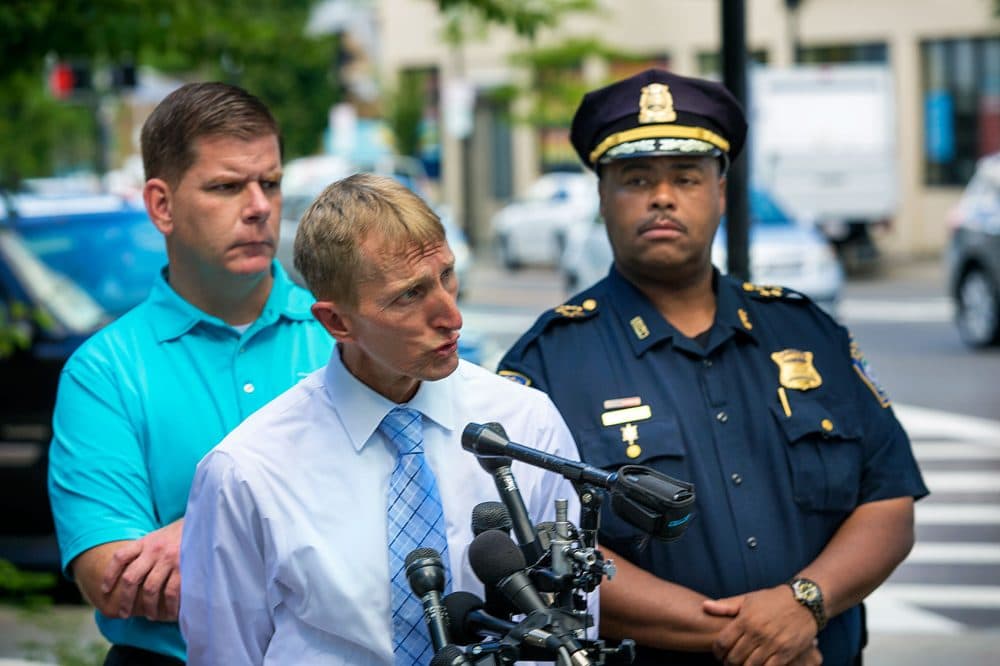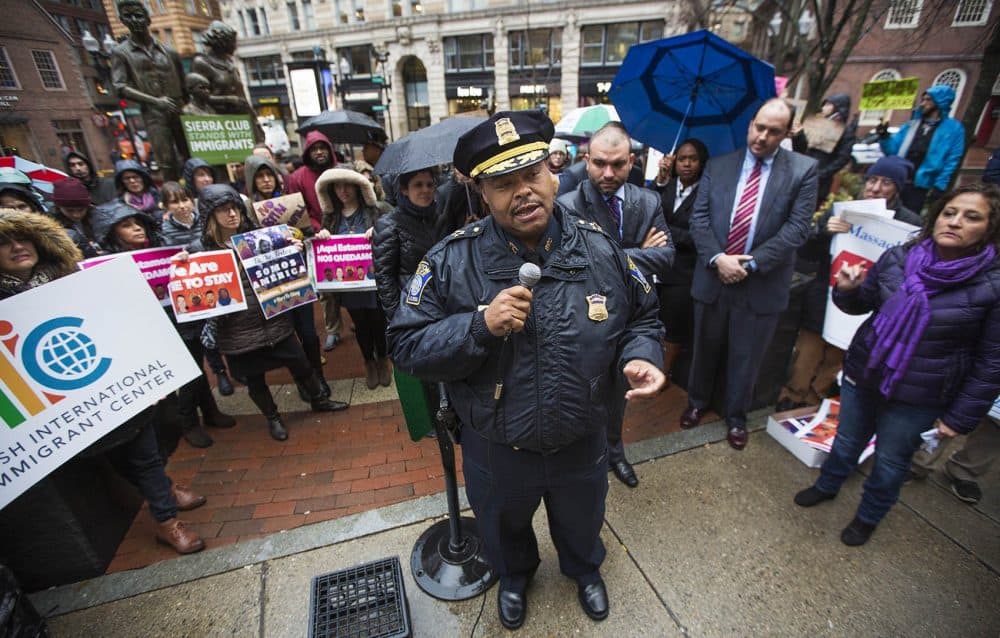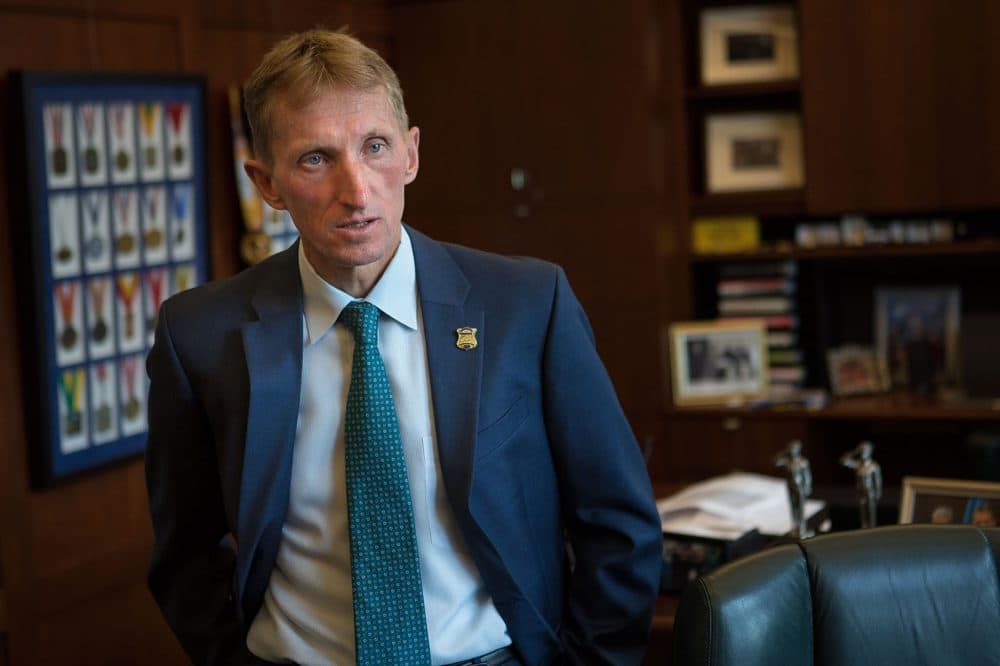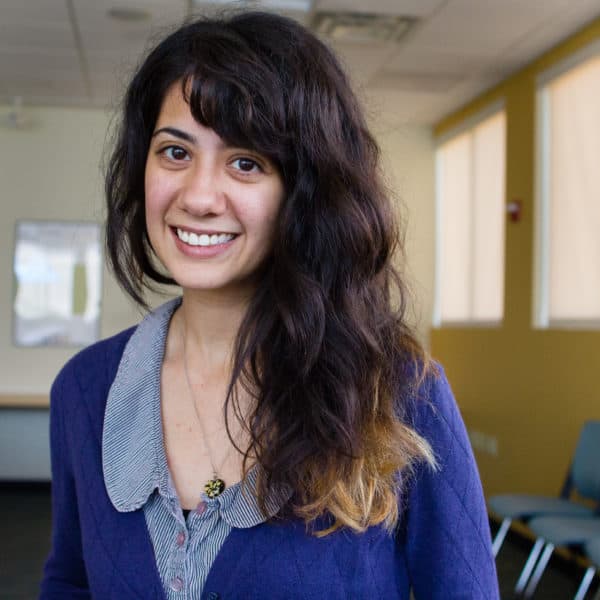Advertisement
Gross Will Become Boston's First Black Police Commissioner, As Evans Retires From Force
Resume
Boston Police Commissioner William Evans is retiring from the department and will take a new job leading Boston College's police force, while his second-in-command — Superintendent-in-Chief William Gross — will become the next commissioner, the first person of color ever to hold the position.
Gross (rhymes with "floss") was widely expected to be a candidate for the post — and an obvious interim commissioner — though some were surprised Walsh picked him to be the permanent commissioner so quickly.
At a press conference Monday morning, Evans, who's 59, announced his rumored retirement. He thanked his family, Walsh and the entire police department.
"I'm only as good as the people I lead, and they've done a great job," he said.
“You know, it's been a great ride,” he added. “I've loved every minute. I can't say that I ever got up a day in my career where I haven't wanted to go to work, and I don't think a lot of people can say that.”
Evans will retire from BPD on Aug. 4. He'll become BC's executive director of public safety and chief of police Aug. 6.
Walsh praised Evans' time on the force and said with him at the helm, Boston police have become a national leader in community policing.
“Since 2014, under Commissioner Evans' leadership, the Boston Police Department has been a national leader for community relations, for youth outreach, making our neighborhoods a safe neighborhood to live, play and work,” Walsh said.
Gross started with Boston police as a cadet, and went on to serve in the gang unit, as an academy instructor and night commander. He's spent the last four years as Evans' second in command.
"I don’t think the city has seen a police leader as loved and trusted in the community as Chief Gross," Walsh said.
At Monday’s press conference, Gross said he wants to continue to improve the department, and tackle youth violence with the public’s help.
“We're going to continue to move our department forward and that can only be done with the community, so that strategy is to work collaboratively with our village,” he said.
Gross was named superintendent-in-chief in 2014, after Evans became commissioner. He’s been a familiar face at crime scenes and community events, and was praised by those who know and have worked with him.

Segun Idowu, with the Boston Police Camera Action Team, recalled sitting down with Gross four years ago for a meeting on police body cameras. A half-hour time slot led to a two-and-a-half hour conversation about the potential for body cameras in the department.
“He was the first person that opened his door to us in the body camera movement,” Idowu said.
But even as he praised Gross, Idowu said he wished there had been more community involvement in the choice. He and many others anticipated Gross would be the natural interim choice, but weren’t expecting a final decision made Monday.
“When it comes to either elected or appointed positions, I will always side with robust community conversation over who should lead in particular departments,” he said. “I do support Commissioner Gross. I like him personally. I think he's a good fit for the position but I would have loved for community process to have been engaged.”
Jamarhl Crawford, a community activist from Roxbury and editor of the Blackstonian, said he was disappointed that Gross was chosen as Evans’ permanent replacement, without any input from the community.
“We don't just want diversity for the sake of diversity, for the image and the optics of it,” he said. “We want the best that we can get and if we don't do a search, I'm pretty sure there was no process, there's no other candidates, there's no competition.”
Larry Ellison, head of the Massachusetts Association of Minority Law Enforcement Officers and a Boston police detective, came up through the department with Gross, and is happy to see one of his classmates reach the highest post.
“There's a lot of pressure being the first,” he said. “So I want to be fair and give him a chance to get adjusted to it and we'll have plenty of time to evaluate the job that's being done.”
City Council President Andrea Campbell says she looks forward to working with Gross and thinks he was the logical choice.
"He was the superintendent-in-chief. The second in command," she said. "Any time I went to a meeting on the issues, he was there and readily available and present. So it seemed like a natural selection."
Gross is the second police commissioner chosen by Walsh. Both Gross and Evans were internal candidates who have spent more than 30 years in the department.
WBZ-TV reported in late June that Evans would step down to take the job at BC, which he and Walsh denied at the time.

The South Boston native joined the city's police force in 1982, and he has served as commissioner for the last four years. The late Boston Mayor Thomas Menino appointed Evans as interim police commissioner in November 2013; Walsh appointed him commissioner the following January.
In 2013, Evans ran the Boston Marathon and, alongside then-Commissioner Ed Davis, commanded department officers as police incident commander at the scene of the bombings, and later during the manhunt for the Tsarnaev brothers and Watertown shootout. He has since led the force's upping of security for each of the marathon's subsequent races. This year, he completed his 20th Boston Marathon.
According to a bio posted on the city's website, Evans "has made historic strides in diversity and inclusion by appointing the first black Superintendent-in-Chief, William Gross, and bolstering his command staff with a 40% representation of minorities and women."
Last August, Evans and his department were criticized by some protesters, reporters and civil rights advocates for what they say was a curtailing of First Amendment speech rights during a highly contentious self-described "Free Speech Rally" on Boston Common planned in the wake of the violence in Charlottesville, Virginia.
Members of the rally, who had invited several alt-right speakers, accused officers of refusing to let them join fellow demonstrators at the Parkman Bandstand. As counterprotesters in the tens of thousands — who far outnumbered the rally attendees — marched to the Common, police cut short the rally by more than an hour of its permitted time and escorted them away from the Common. The showdown was mostly peaceful.
Before he became commissioner, Evans was also superintendent in charge of the bureau of field services. In this role he helped oversee the peaceful, 70-day Occupy Boston protest in Dewey Square.
Evans' older brother, Paul Evans, also served as Boston police commissioner.
With additional reporting by WBUR's Newsroom
Correction: Due to an editing error, an earlier version of this story misstated when Evans would be leaving BPD. He retires on Aug. 4. We regret the error.
This article was originally published on July 23, 2018.
This segment aired on July 24, 2018.

